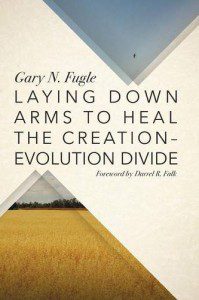 Part II of Gary N. Fugle’s new book Laying Down Arms to Heal the Creation-Evolution Divide looks at prominent questions that concern many Christians arising from the evidence for the age of the earth (4.5 billion years) and by evolutionary biology. Gary Fugle (Ph.D. UC Santa Barbara) is a Christian who spent many years as a biology professor (now retired) at Butte College in Oroville, near Chico California. He has heard all the typical “Christian” (i.e. spontaneous creationist) responses to evolutionary biology, some needing serious reflection, others somewhat concerning. I will focus primarily on the chapter 4 (What Can the Natural World Tell Us?) and summarize only briefly chapter 5 (God Wouldn’t Do It That Way) and chapter 6 (Foundational Views in Christian Faith). I recommend the chapters in their entirety to those interested in this discussion.
Part II of Gary N. Fugle’s new book Laying Down Arms to Heal the Creation-Evolution Divide looks at prominent questions that concern many Christians arising from the evidence for the age of the earth (4.5 billion years) and by evolutionary biology. Gary Fugle (Ph.D. UC Santa Barbara) is a Christian who spent many years as a biology professor (now retired) at Butte College in Oroville, near Chico California. He has heard all the typical “Christian” (i.e. spontaneous creationist) responses to evolutionary biology, some needing serious reflection, others somewhat concerning. I will focus primarily on the chapter 4 (What Can the Natural World Tell Us?) and summarize only briefly chapter 5 (God Wouldn’t Do It That Way) and chapter 6 (Foundational Views in Christian Faith). I recommend the chapters in their entirety to those interested in this discussion.
A God of Deception? The earth looks old, very old. Of this there is no real doubt or disagreement. One way that Christians reconcile this appearance of age with the age inferred from Genesis – a six day creation and counting the years in the genealogies – is to postulate a mature creation. Fugle sees two significant problems with this approach.
First, it means that nothing can be truly known about the past. For some conservative Christians, this leads to a clean and simple conclusion that the Bible is the only reliable source for knowledge about historic events. But it also suggests that all or a large part of many scientific disciplines, including cosmology, astronomy, physics, geology, and pre-biblical archaeology, are based merely on illusion. (p. 34)
A second and perhaps more crucial implication of the false appearance argument is what it suggests about God, the Creator. It implies that his creation is full of deception – not just a little, but detailed and elaborate deception.
… According to Psalm 19:1-2, “The heavens declare the glory of God, the skies proclaim the work of his hands. Day after day they pour forth speech; night after night they display knowledge” (my emphasis). Christians are called to trust in a God who is wholly truthful and faithful, not one who would create a deceptively fake image of reality in his natural creation. The important implication is that God reveals truth both in the Bible and in nature. (p. 35)
The old earth progressive creation view can escape many of these problems, but there is still an an appearance of evolution embedded, for example, in the genomes of diverse life forms. These are not obvious to a casual observer, but are convincing to the vast majority of trained biologists, both Christian and non-Christians. They are also convincing to most of us trained in other areas who are familiar with genetic data.
A Matter of Interpretation. Fugle understands the high authority of the Bible in Christian thought and life. He agrees with it. The issue isn’t the authority of scripture. It is important to distinguish between the authority of scripture and the authority of a particular interpretation of scripture.
There is a crucial distinction here between the inerrancy of Scripture itself and the supposed inerrancy of any particular interpretation of Scripture. If there are good natural evidences to support evolution, or a very old age for the earth, then to claim we should defer to a young-earth interpretation of the Bible is really an emotional appeal inappropriately fortified by reference to our high view of Scripture. A young-earth creationist interpretation is not equivalent to the Bible itself. (p. 38)
 This is a key point – and Fugle backs it up by reference to church leaders and thinkers including Augustine, Thomas Aquinas, John Calvin, Charles Hodge. He quotes Thomas Aquinas, Summa Theologica First Part, Question 68, Article I, Answer.
This is a key point – and Fugle backs it up by reference to church leaders and thinkers including Augustine, Thomas Aquinas, John Calvin, Charles Hodge. He quotes Thomas Aquinas, Summa Theologica First Part, Question 68, Article I, Answer.
Two rules are to be observed, as Augustine teaches. The first is, to hold the truth of Scripture without wavering. The second is that since Holy Scripture can be explained in a multiplicity of senses, one should adhere to a particular explanation, only in such measure as to be ready to abandon it, if it be proved with certainty to be false; lest Holy Scripture be exposed to the ridicule of unbelievers, and obstacles be placed to their believing.
Neither Thomas Aquinas or Augustine were closet evolutionists – they both held views consistent with their respective thirteenth century and fifth century contexts. But the two rules are ones we can affirm still today, even when some of our conclusions based on increasing knowledge of God’s creation change.
Presuppositions exist – but don’t explain away the data. It is common for spontaneous creationists to claim that it is the naturalistic presuppositions of scientists that lead to evolutionary theory. The implication is that knowledge from from the Bible is infallible, but knowledge derived from observation of the natural world is intrinsically fallible. That human interpretations are fallible goes without saying. But this doesn’t really get us anywhere. As Fugle points out:
We cannot logically reject an open study of natural information because we understand humans are fallible and then ignore the necessary correlate that it is the same fallible humans who are attempting to interpret the Bible. If we cannot be trusted with correct interpretations of science, why should we think we can be interpreted with interpretations of the biblical text? Some Christians may claim that the Holy Spirit will open our eyes to the words of Scripture, but there are no solid grounds for claiming that the Holy Spirit cannot lead believers just as faithfully in interpreting God’s natural creation. (p. 40-41)
While many biologists and other scientists do proceed with atheist, agnostic, and naturalist presuppositions most Christian scientists see the same data, listen to the same arguments, and arrive at the same basic conclusions concerning the science itself. There are at times overly ambitious metaphysical conclusions drawn (i.e. science disproves God and there is no purpose or teleology to life) but these do not undermine the basic science.
Time Marches On. The Bible was written many millenia ago. We should not expect the conclusions of modern science to appear in the text. The purpose is not to teach science, but to reveal God’s relationship with his creation and creatures.
The Bible will always inform our scientific view by declaring that there is a sovereign Creator-God behind everything that is studied, but we should not be surprised that science reveals aspects of creation that were not described or hinted at in the biblical texts. … This is not an elevation of general revelation (nature) over special revelation (the Bible); it is an integrated coherent view of God’s message to his people. The proposition is not to compromise one’s devotion to God or to be “blown here and there by every wind of teaching” (Eph 4:14) but to expand one’s understanding of how awesome God is. It is also not to compromise the integrity of the Bible but to fully enhance one’s interpretation of Scripture to include all the glory that God has chosen to reveal. (p. 44)
Bloody, Random, and New. The next two chapters in Laying Down Arms explore the objections that some Christians raise to an evolutionary view of creation. Most notably, that evolution is both red in tooth and claw and random. Fugle works through these objections pointing out that random does not necessarily mean “purposeless.” Random processes can be used to produce great things. He also discusses the “bloody” nature of evolution (by the way, no more violent than the nature we observe around us every day). He points out that there is nothing in the Bible that claims that all death was absent in Eden.
There is also the claim that evolution is new with the implication that if it was good enough for Augustine, Aquinas, or Calvin, it is good enough for us. To address this concern Fugle looks at the foundational views in Christian faith. Although these men were all committed to the Scripture, they held a range of views concerning creation and argued against various views active in their context and culture. It is also true that responses to evolution were varied with both acceptance and rejection in the first hundred years – 1859-1959. (We looked at the variety of reactions among Presbyterians as described in David N. Livingstone’s Dealing with Darwin (Posts))
The only universal Christian doctrine of creation through history has been that God created the heavens and the earth and all that is in them.
Even further, real Christian orthodoxy as demonstrated by leading church theologians has been to wrestle and reevaluate specific interpretations of biblical passages, not to hold fast to single readings. The great thinkers in history were humble to the fact that their conclusions were always subservient to the real truth known only by God. … The strongest Christian tradition has been to actively formulate biblical understandings that coincide with natural revelations. Given our expanding knowledge of the natural world, we should grant that the best interpretations expressed in the past are not necessarily the best interpretations now. In this way, when believers consider the encompassing view of evolutionary creation we are actually following the inspirational lead of great Christian thinkers and foundational theologians in church history. (p. 64-65)
Does God, through the Holy Spirit, protect our interpretation of Scripture but not our interpretation of the natural world?
What does it mean to be humble in our conclusions and confident in our faith?
What are the primary question surrounding evolutionary biology and Christian faith?
If you wish to contact me directly you may do so at rjs4mail[at]att.net
If interested you can subscribe to a full text feed of my posts at Musings on Science and Theology.











